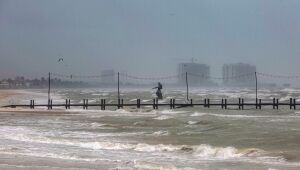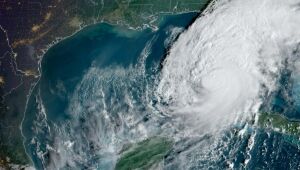A huge ball of plasma and its magnetic field expelled by the Sun is expected to collide with the Earth on Thursday morning (10), which could trigger the aurora borealis, according to US meteorologists.
This phenomenon occurs when the Sun is approaching – or may already be – the peak of its 11-year cycle, a time when solar activity is at its peak.
In May, the planet witnessed the strongest geomagnetic storms in two decades, causing colorful scenes to appear in the night sky far from the poles.
“The current forecast is that it will arrive tomorrow morning until noon Eastern time and may continue until the next day,” Sean Dahl of the US Space Weather Prediction Center said in a press conference on Wednesday morning.
As a coronal mass ejection (CME) travels through space at four million kilometers per hour, the agency has activated monitoring of Level 4 (G4) geomagnetic storms.
This is a lower level than the maximum possible, G5, observed in May, but the final result may be lower or higher than G4 itself.
It will not be possible to make more accurate predictions until about 15 or 30 minutes before the collision, when their paths intersect with observation satellites.
According to Dahl, the Federal Emergency Management Agency (FEMA), which is already under pressure due to the consequences of Hurricane Helen and the proximity of Hurricane Milton, as well as the companies that manage the US electrical grid, have been informed so that they can take action. To dilute if necessary.
When coronal ejections collide with Earth’s magnetosphere, they can create geomagnetic storms. These storms can disrupt satellites orbiting Earth and affect technologies such as radio signals and GPS systems.
According to experts, the aurora will be most visible far from city lights, in skies as dark as possible, for those who live at suitable latitudes, and will likely reach as far south as northern California or Alabama in the United States.
People can use their cameras or phones to observe this phenomenon, as current digital images can often capture auroras, even when the naked eye cannot see them.
See also

tornado
Four fishermen who survived the hurricane in Mexico have been rescued

tornado



![[VÍDEO] Elton John’s final show in the UK has the crowd moving](https://www.lodivalleynews.com/wp-content/uploads/2023/06/Elton-John-1-690x600.jpg)

More Stories
What ChatGPT knows about you is scary
The return of NFT? Champions Tactics is released by Ubisoft
What does Meta want from the “blue circle AI” in WhatsApp chats?